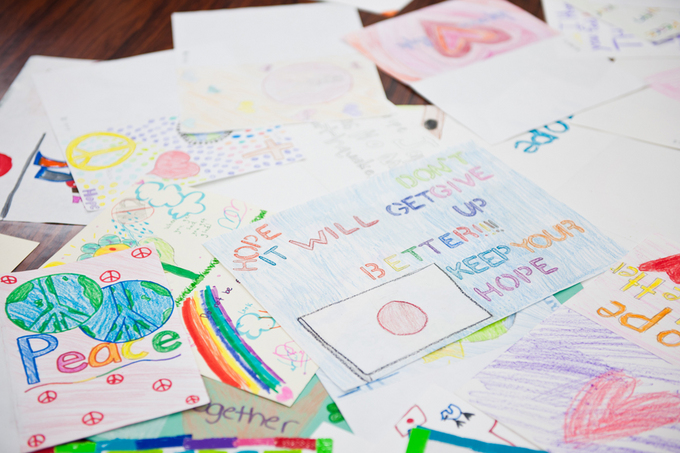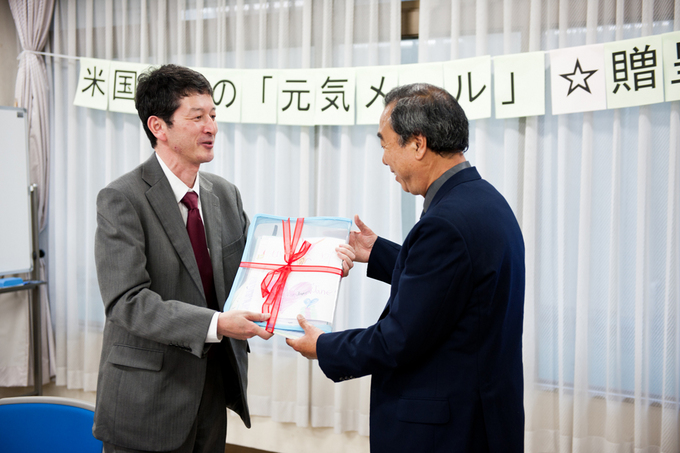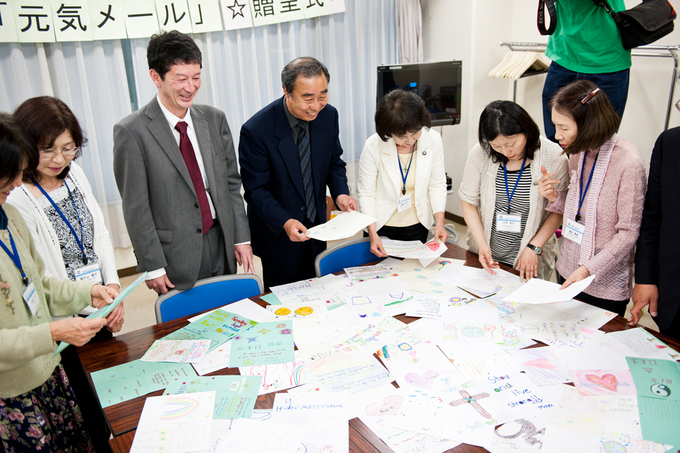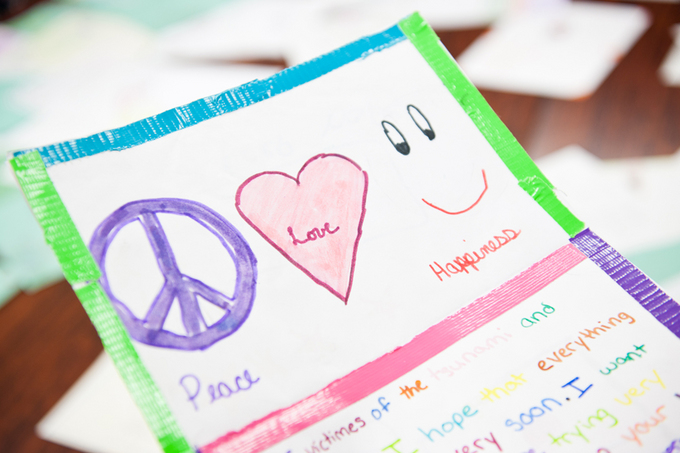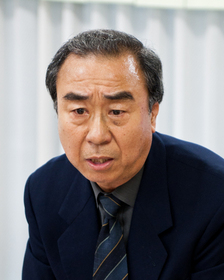Special Series: Connect with Tohoku--Real Voices 007
Cheerful Messages Give Disaster Victims the Courage to LiveYukitaka Uritani
Asia Africa Cooperation Environment Center Director
Ater the Great East Japan Earthquake, the Japan Foundation initiated the "Genki Mail (Home Messages) project to give courage to the people affected by the disaster. We collected messages from school children in the United States and delivered them to people in the disaster-struck areas. The idea of "Genki Mail" was originally conceived by Yukitaka Uritani, director of the Asia Africa Cooperation Environment Center (ACEC), after the Great Hanshin Earthquake in 1995. Young American journalists played an important role in collecting letters in the U.S. All of them had been participants of our US-Japan Journalism Fellowship: Japan Visit Program for US Postgraduate Students.
We asked Uritani how he came up with the idea of "Genki Mail" and about his activities after the recent disaster in Tohoku.
The Great Hanshin Earthquake
On January 17, 1995, I was awakened before dawn by a roaring sound I'd never heard before. I couldn't tell where it was coming from, but I felt something terrible was happening. The next moment, the ground jolted upward and I felt my body being lifted into the air. I dashed into the next room where my mother was sleeping and hunched over her. Violent shakes came with rumbling sounds and we were plunged into darkness.
The room seemed to have caved in, but I couldn't see anything in the pitch dark. At least I knew I was still alive. I checked to see if my mother was all right. She said, "I'm fine. I'm not hurt."
I had no idea how long we were trapped in the rubble. I didn't know what to do, and it was hard to think straight. But when I heard my neighbor across the street calling out, "Mr. Uritani, are you all right?" I thought I had to get out of there somehow.
I managed to crawl out from under the collapsed house and saw the town in flames all around. Looking at the rubble where my house used to stand, I thought it must be a dream. I smelled gas in the air and heard loud blasts. I stood there in a daze, looking at pillars of fire and flying sparks.
Since I had a pain in my chest and cuts on my leg, I went to an emergency hospital. I received treatment for three broken ribs and had three stitches on my left leg. After leaving the hospital, I went to the post office near my house where my neighbors were taking shelter. Unlike official evacuation centers, there were no supplies of food or water. We staved off our hunger with snacks and canned juice someone had fetched from their home and lit candles also brought by someone. In this way, the longest day of my life ended.
Heartfelt message gives moving force
On the following day, my closest friend came to check up on me. Seeing his face, I felt the emotions welling up. He had food and clothes for me, and lent me some money to tide us over. Thanks to his kindness, I found the energy to live for the first time since the disaster.
I was worried about the office of the Asia Africa Cooperation Environment Center, the non-governmental organization I had started. Since it was in an old building, I didn't think it could have withstood the quake. I asked my friend to take me to my office on his motorcycle. Everything I saw along the way was utterly heart-wrenching. The whole town was a ramshackle. I managed to get to the office and found it had sustained surprisingly little damage, even though the building was almost 50 years old. Only files and papers were scattered all over the floor.
I noticed that the fax machine, which had also fallen onto the floor, was belching out an endless stream of paper. I picked up one of the sheets and looked at it. It was from a friend in China, and it contained an old Chinese proverb: "When disaster strikes, help comes from all sides." I also found a message from Mongolia which said, "A friend in need is a friend indeed. Measure your friend when you're in trouble." I pictured the familiar faces of my friends, whom I had met through overseas volunteer activities. Having lost my house, belongings and close acquaintances in the terrible disaster, my heart was filled with fear and despair, but my friends across the sea gave me courage. I learned that a heartfelt message, even a simple one, can give us the courage to move forward.
Illustrated postcards from school children
That very day, I started volunteer activities anew. Being a disaster victim myself, I lived in an evacuation center for 6 months, during which time I saw other evacuees moving on into temporary housing. Having to share the space with many others, getting out of the shelter was the earnest wish of many evacuees. Yet we heard sad reports almost every day about people who'd moved into temporary housing only to end up killing themselves or suffering a lonely death and being found many days later. Why did they have to die after their dream had come true? The reason was that the loneliness and anxiety about the future had undermined their spirit.
Day after day, I kept thinking about how to stop people from dying a lonely death. Then one day I remembered the messages that had arrived from overseas the day after the earthquake. I asked volunteers in Hiroshima to collect messages from elementary school children addressed to the disaster victims in Kobe. Once I received the letters, I delivered them to people in temporary housing. From then on, the children and evacuees started writing to each other. An elderly person told me that he felt uplifted and read the letter over and over. People started calling these letters, "Genki Mail."
Cheer up victims and create bonds
After the Great East Japan Earthquake, I asked the Japan Foundation Center for Global Partnership to invite people in the United States to write to disaster victims. In just two months, we received 7,000 letters from children across the US. From June 28 to 30, I delivered them to Kesennuma Elementary School and Ishinomaki Red Cross Hospital.
The children in Japan who received the letters were exhilarated and told me they would write back. The kids in the two countries are starting to exchange letters, and they will look forward to seeing each other sometime soon. I was reminded that you can live just by having someone caring about you, somewhere in the world.
We also received 120 letters from children in Mongolia as well as 150 from within Japan. One of the senders, who said he was wheelchair-bound, wrote: "Thank you for giving me the opportunity to join the volunteer activity by writing this letter."
"Genki Mail" conveys the warmth of those who write them, those who deliver them, and those who translate them. They give hope to people suffering from the disaster and give them the strength to live. I am grateful to everyone involved in the "Genki Mail" project. Thank you!
Born in Kobe in 1947, Uritani started volunteer activities in 1990. He founded the Asia Africa Cooperation Environment Center in 1993, and has sent a total of 12,000 tons of food and clothing, as well as ambulances and fire engines, as relief supplies to 17 countries suffering from disasters. He started the "Genki Mail" project in July 1995 by sending encouraging messages to those living in temporary housing in Kobe.
Keywords
- Social Securities/Social Welfare
- NPO/NGO
- Japan
- Mongolia
- United States
- Great East Japan Earthquake
- Asia Africa Cooperation Environment Center
- Yukitaka Uritani
- Japan Foundation Center for Global Partnership
- Great Hanshin Earthquake
- temporary housing
- suicide
- lonely death
- Genki Mail
- Kesennuma Elementary School
- Ishinomaki Red Cross Hospital
Back Issues
- 2019.8. 6 Unraveling the Maker…
- 2018.8.30 Japanese Photography…
- 2017.6.19 Speaking of Soseki 1…
- 2017.4.12 Singing the Twilight…
- 2016.11. 1 Poetry? In Postwar J…
- 2016.7.29 The New Generation o…
- 2016.4.14 Pondering "Revitaliz…
- 2016.1.25 The Style of East As…
- 2015.9.30 Anime as (Particular…
- 2015.9. 1 The Return of a Chin…


